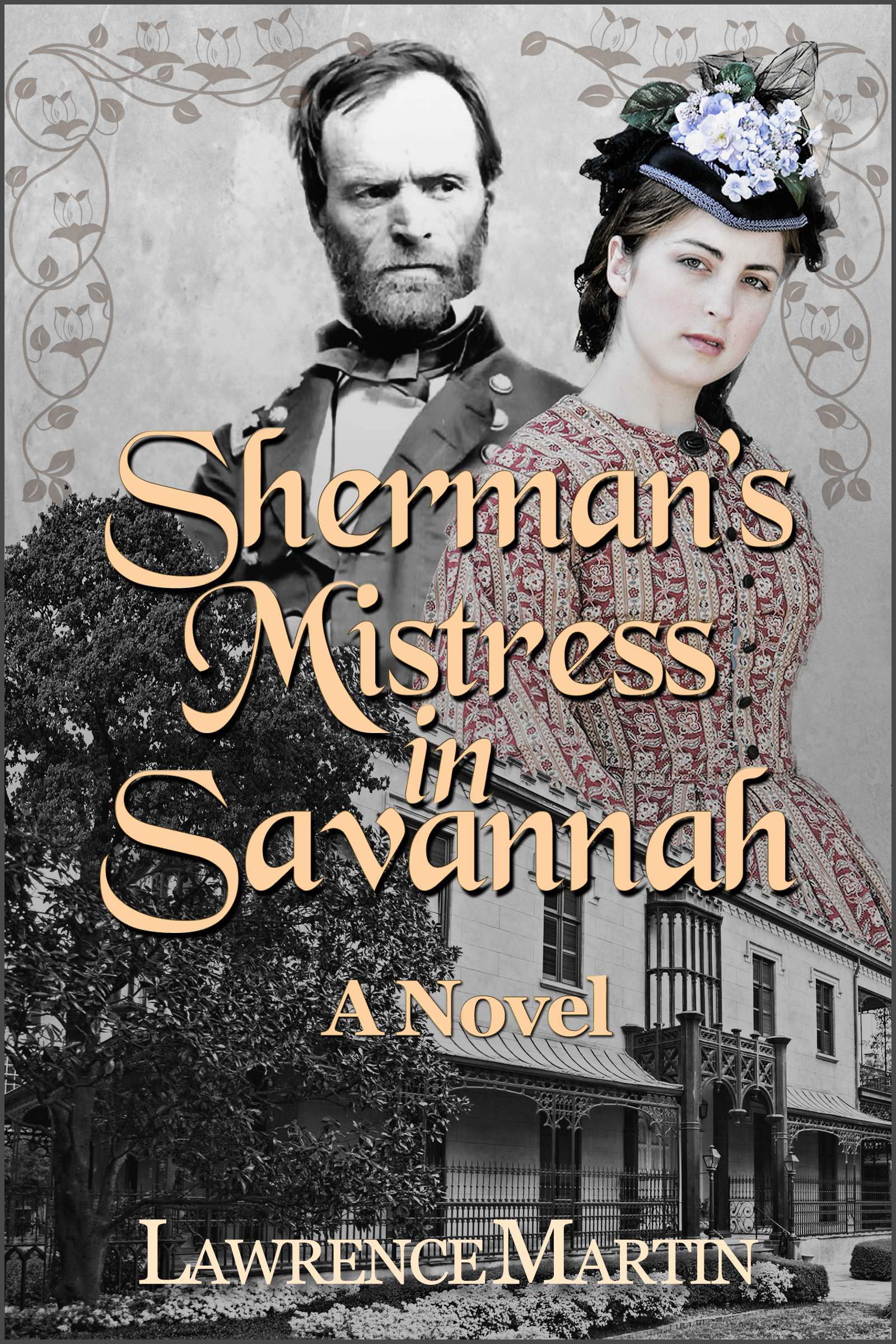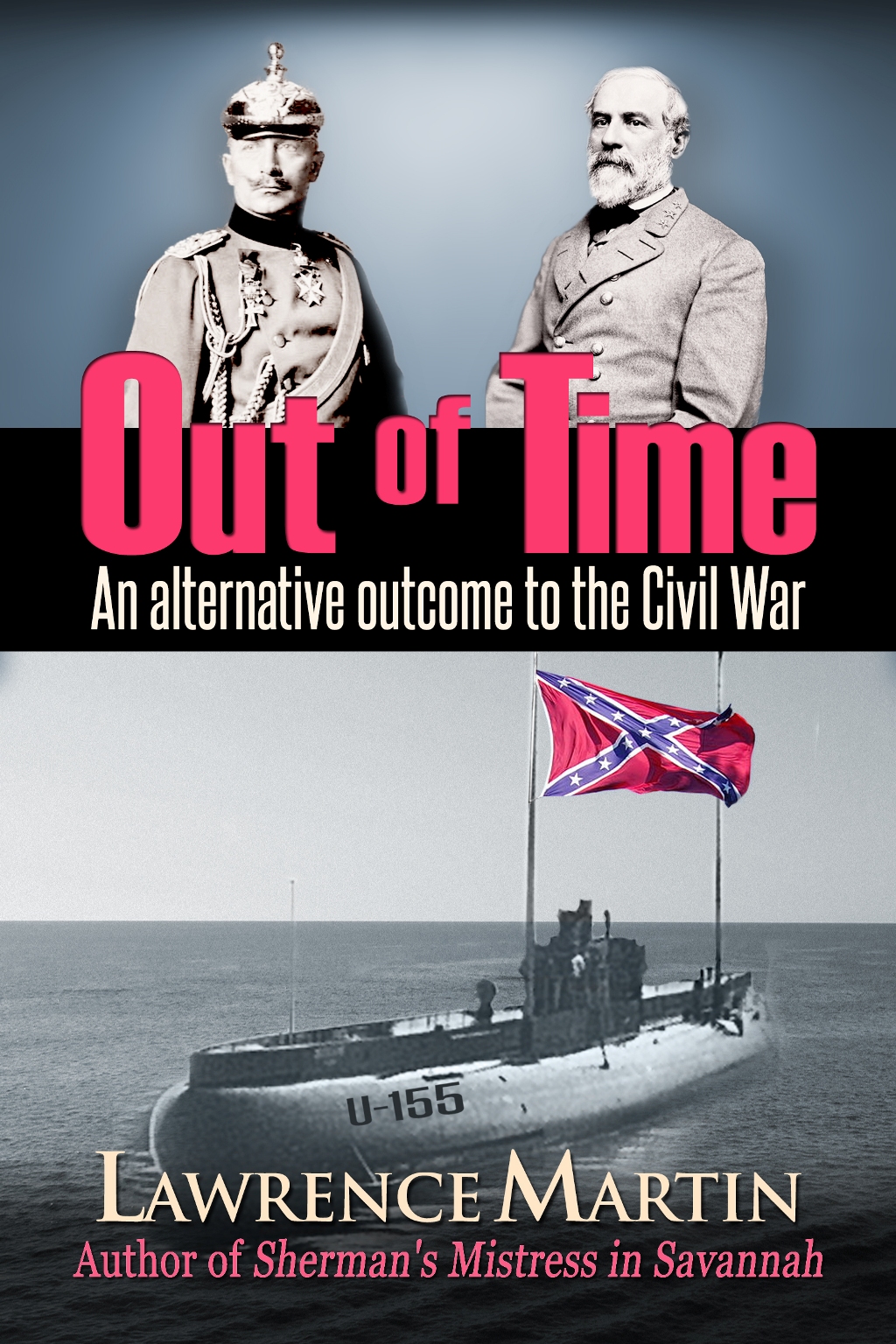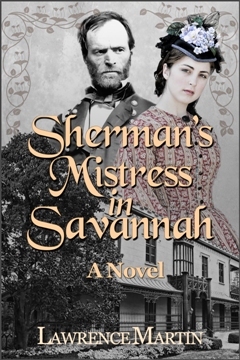Gen. Sherman's famous telegram to Pres. Lincoln, Dec 1864
Lawrence Martin
What was this famous telegram?
It is well known that in Nov-Dec 1864 General William Tecumseh Sherman (photo) led an army of 62,000 union soldiers some 300 miles from Atlanta to Savannah.
Along the way his army 'lived off the land' and caused extensive property destruction, while at the same time freeing thousands of slaves.
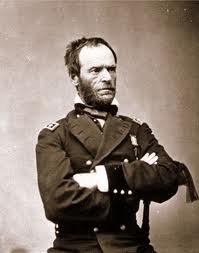 Before the march began, much of Atlanta
had been burned by Union forces. If there was to be any battle for Savannah,
that city would be burned as well. However, the Confederate forces protecting Savannah
were so outmanned (about 10,000 total), that instead of fighting a losing battle they evacuated. Beginning late on Tuesday,
Dec 20, 1864 and continuing after midnight, the army walked
across the Savannah River on a pontoon bridge, into South Carolina. At the same time,
Confederate gun boats were scuttled.
Before the march began, much of Atlanta
had been burned by Union forces. If there was to be any battle for Savannah,
that city would be burned as well. However, the Confederate forces protecting Savannah
were so outmanned (about 10,000 total), that instead of fighting a losing battle they evacuated. Beginning late on Tuesday,
Dec 20, 1864 and continuing after midnight, the army walked
across the Savannah River on a pontoon bridge, into South Carolina. At the same time,
Confederate gun boats were scuttled.
With the city was defenseless against Sherman's army, in the early morning
hours of Dec 21, 1864, Savannah's mayor and aldermen hastened to meet
the union commander closest to the city, General John Geary. The mayor, physician Richard Arnold, implored the general not to destroy the city, and there was really no reason to.
Thus there was no battle of Savannah and the city was spared. As illustrated in Harper's Weekly, the
Union Army entered Savannah that morning, unopposed.
At the time Sherman was on his way back from Hilton Head, South Carolina, where he had been conferring with the Union Navy about the coming invasion of Savannah.
Although Sherman left Hilton Head by
boat December 20, 1864, bad weather delayed his return until late on Wednesday, Dec 21. On Thursday morning, Dec 22, Sherman was invited by Englishman Charles Green to move his
headquarters to Green's mansion, and he accepted. (Photo on left shows Green's house in 1865. Right photo is a current view of one side of the house.
Now known as the Green-Meldrim mansion, it is restored and open for visitors.
Click here for Sherman Headquarters website.

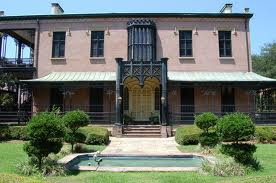 Click here for short video about Sherman's Savannah headquarters).
It was from this house on Dec 22, 1864, in the southwest bedroom on the 2nd floor,
that Sherman handwrote his famous 'telegram' to President Lincoln, offering Savannah as a
Christmas gift.
Click here for short video about Sherman's Savannah headquarters).
It was from this house on Dec 22, 1864, in the southwest bedroom on the 2nd floor,
that Sherman handwrote his famous 'telegram' to President Lincoln, offering Savannah as a
Christmas gift.
What did the telegram say?
As printed in history books and numerous web sites:
To his Excellency, President Lincoln,
I beg to present you as a Christmas gift the city of Savannah with 150 heavy guns and plenty of ammunition, and also about twenty-five thousand bales of cotton.
W. T. Sherman
Maj-Genl
The actual message Sherman wrote out is shown below.
 />
/>
How was it sent?
It was NOT a telegram as we might think of today, i.e., a message sent instantly over wires to the recipient. At the time there was no direct or reliable telegraph service from Savannah to Washington, D.C. Instead it was sent by the steamer Golden Gate to Fortress Monroe, Virginia, and from there the message was wired to the president.
Whose idea was it?
Not Sherman's. Instead it was the idea of the U.S. Treasury Agent for the Department of the South, one Albert Gallatin Browne. As Sherman related in his Memoirs, Volume 2, (Savannah and Pocotaligo, page 231):
Within an hour of taking my quarters in Mr. Green's house, Mr. A.G. Browne, of Salem, Massachusetts, United States Treasury agent for the Department of the South, made his appearance to claim possession, in the name of the Treasury Department, of all captured cotton, rice, buildings, etc. Having use for these articles ourselves, and having fairly earned them, I did not feel inclined to surrender possession, and explained to him that the quartermaster and commissary could manage them more to my liking than he; but I agreed, after the proper inventories had been prepared, if there remained any thing for which we had no special use, I would turn it over to him. It was then known that in the warehouses were stored at least twenty-five thousand bales of cotton, and in the forts one hundred and fifty large, heavy sea-coast guns; although afterward, on a more careful count, there proved to be more than two hundred and fifty sea-coast guns, and thirty-one thousand bales of cotton. At that interview Mr. Browne, who was a shrewd, clever Yankee, told me that a vessel was on the point of starting for Old Point Comfort, and, if she had good weather off Cape Hatteras, would reach by Christmas-day, and he suggested that I might make it the occasion of sending a welcome Christmas gift to the President, Mr. Lincoln, who peculiarly enjoyed such pleasanty. I accordingly sat down and wrote on a slip of paper, to be left at the telegraph-office at Fortress Monroe for transmission, the following:
Savannah Georgia, December 22, 1864
To His Excellency President Lincoln, Washington, D.C.:
I beg to preset you as a Christmas-gift the city of Savannah, with one hundred and fifty heavy guns and plenty of ammunition, also about twenty-five thousand bales of cotton.
W.T. Sherman, Major-General
When did Lincoln receive it?
Sherman wrote in his memoirs that: "This message actually reached him on Christmas-eve..." However, in his Civil War News review of Stanley Weintraub�s book General Sherman's Christmas, Carl Schenker Jr. writes: "...Weintraub stumbles into various errors of detail. He places the Confederacy�s Jefferson F. Davis in the prewar Cabinet of James Buchanan rather than that of Franklin Pierce. He wrongly reports bad blood between Sherman and Union chief-of-staff Henry W. Halleck at a time when their relations were cordial. And he puts Sherman�s Christmas-gift message into Lincoln�s hands on Christmas Eve, one day early according to the extant military telegram."
Here Schenker is referring to the actual telegram sent from Fortress Monroe to Washington, DC. Sherman's handwritten note left Savannah by boat the afternoon of December 22, 1864. On arrival to Fortress Monroe, the message was telegraphed over wires to the War Department, which then delivered it to the president. In other words, it appears the telegram reached Lincoln on Christmas Day, not Christmas Eve. A chronology of Sherman's message is listed below (subject to revision if better information becomes available):
12/22/1864 - Sherman's handwritten note leaves Savannah by steamer Golden Gate for
Fortress Monroe, Virginia
12/24 or 12/25 - Golden Gate arrives to Fortress Monroe
12/25 - Sherman's message is telegraphed to War Department, Washington, DC (a distance of 181 miles)
12/25 - War Department writes message in long hand after receipt from Fortress Monroe
12/25 - The handwritten transcription (below) is delivered to the president. Note the date is "Dec 25, 1864." Why Sherman wrote that President Lincoln received his message Christmas Eve (12/24) instead of Christmas Day (12/25) is unclear, but not important. Whatever the date and time delivered, his message was surely the best 'Christmas gift' any president has ever received.
12/26 - News story about the telegram appears on front page of New York Times
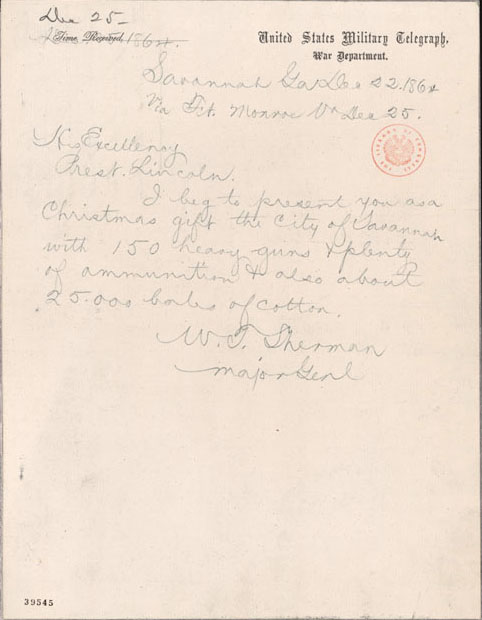
How did the public learn of this telegram?

According to the National Archives web site, "President Lincoln was thrilled to hear this news, which he immediately publicized throughout the nation." To a war-weary public, both the capture of Savannah and the way Sherman chose to announce it were sensational stories. Part of the front page of the NYT from December 26, 1864 is shown above. Click here for full front page and click here to read the article. Note that in the NY Times article the statistics in Major-General Foster's account differ somewhat from Sherman's. Maj-Gen J.G. Foster was Commander of the South, which meant he was in charge of beachheads on the coast. When Sherman left Savannah with his army for the Carolina campaign, on January 21, 1865, he turned over command of Savannah to Foster. Foster kept his headquarters in Hilton Head and sent an army division to occupy the city.
How did Lincoln respond?
On December 26, Lincoln wrote a letter of thanks to Sherman, stating:
"MY DEAR GENERAL SHERMAN: Many, many thanks for your Christmas gift, the capture of Savannah. When you were about leaving Atlanta for the Atlantic coast, I was anxious, if not fearful; but feeling that you were the better judge, and remembering that 'nothing risked, nothing gained,' I did not interfere. Now, the undertaking being a success, the honor is yours; for I believe none of us went further than to acquiesce. And taking the work of General Thomas into the county, as it should be taken, it is indeed a great success. Not only does it afford the obvious and immediate military advantages, but, in showing to the world that your army could be divided, putting the stronger part to an important new service, and yet leaving enough to vanquish the old opposing force of the whole -- Hood's army -- it brings those who sat in darkness to see a great light. But what next? I suppose it will be safer if I leave General Grant and yourself to decide. Please make my grateful acknowledgments to your whole army, officers and men."
The first page of Lincoln's reply is shown below.
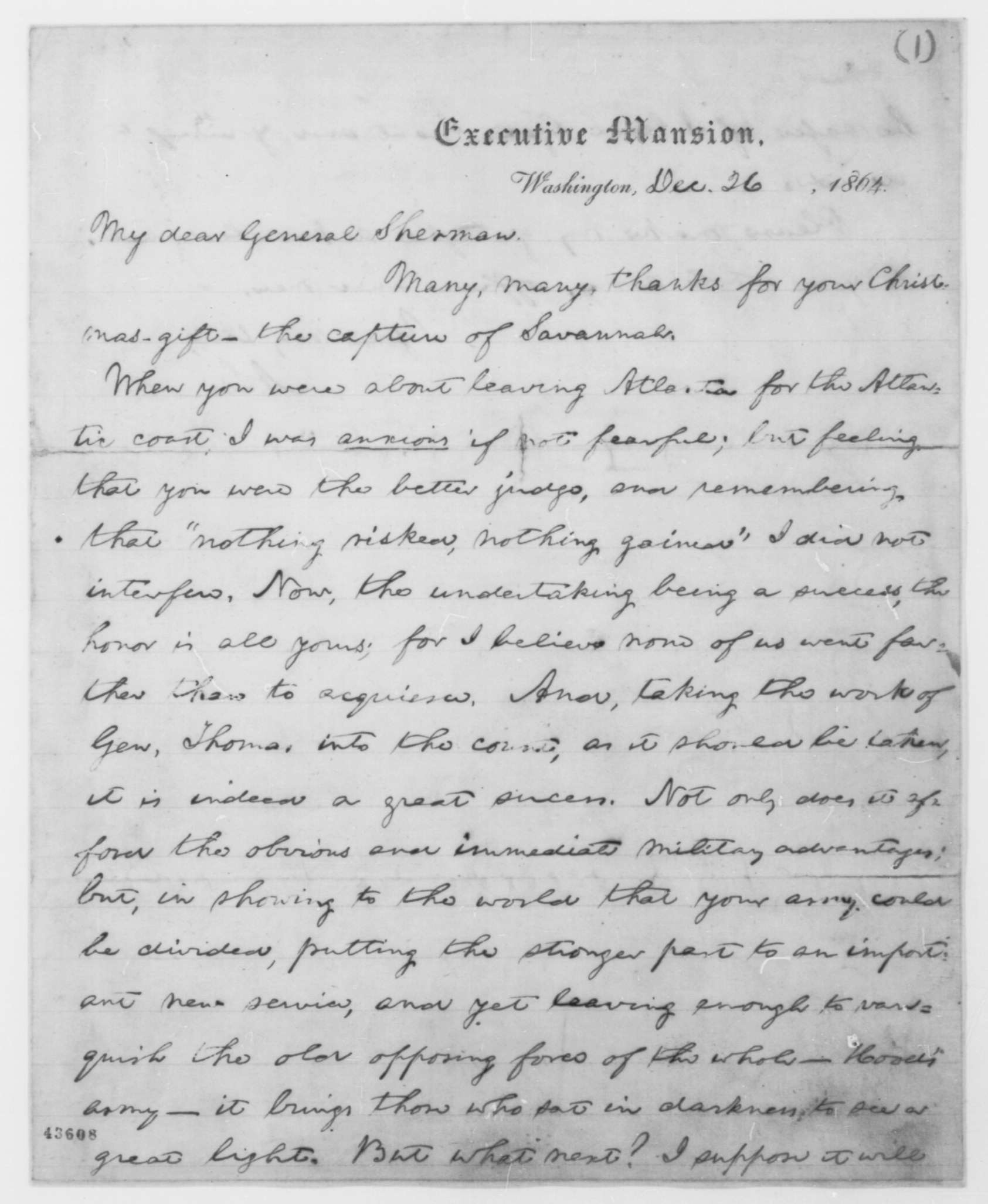
Regarding Lincoln's reference to General George Thomas: On Dec 15-16, 1864, General Thomas had defeated Confederate General John Hood at Nashville. Lincoln's reply was delivered to Sherman on December 28 by Major General John A. "Black Jack" Logan, who "happened to be in Washington, and was coming to Savannah, to rejoin his command." Quoted from Sherman's Memoirs, which is available free on Google, and also in print form from amazon.com.
Where are these documents today?
Sherman's original note to Lincoln -- the original "telegram" handwritten 12/22/1864 -- is in the National Archives Building, 7th and Pennsylvania Avenue NW, Washington, DC, 20408. In the National Archives web site search for "Sherman Telegram to Lincoln," and the top link retrieved should be Sherman's famous telegram.
The telegram that was actually delivered to Lincoln -- the handwritten note transcribed on receipt of message from Fortress Monroe 12/25/1864 - is in the Manuscript Division of the Library of Congress.
Lincoln's handwitten reply on December 26, 1864 is also in the
Manuscript Division, LOC.
Website updated June 3, 2016. Please use feedback form below for any comments or corrections. Thank you.
Feedback Form
Your name (optional):
Your email (optional):
Comments:
